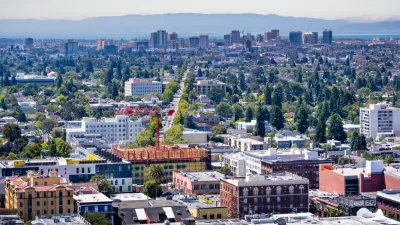Richmond, Virginia has decided to study the idea of removing parking minimums to lower the cost of housing and make more efficient use of land in the city.

"Richmond City Council members [in May] advanced a proposal to study striking rules about the minimum number of parking spaces new developments must have," reports Chris Suarez.
"City planners in recent years have promoted the concept in principle, adopting new zoning and future plans that emphasize public transit and converting commercial and public parking lots into buildings that generate more tax revenue," reports Suarez.
City Councilmember Andreas Addison, who represents the city's first council district, proposed the study with the ultimate goal of eliminating the city's parking requirements. Councilmember Addison has emerged as a leading voice for parking reform, as further evidenced in another May article written by Roberto Roldan. The parking reform movement has been active in Richmond since at least 2017, with an article written at the time by Michael C. Hild.
According to the article by Suarez, the city has already shown the capacity for zoning reforms that prioritize public transit and adaptive reuse, like in the Monroe Ward and Scott’s Addition areas.
[Editor's note: Suarez reports the story after a committee vote, but before full City Council approval, which came a week later.]

Maui's Vacation Rental Debate Turns Ugly
Verbal attacks, misinformation campaigns and fistfights plague a high-stakes debate to convert thousands of vacation rentals into long-term housing.

Planetizen Federal Action Tracker
A weekly monitor of how Trump’s orders and actions are impacting planners and planning in America.

San Francisco Suspends Traffic Calming Amidst Record Deaths
Citing “a challenging fiscal landscape,” the city will cease the program on the heels of 42 traffic deaths, including 24 pedestrians.

Defunct Pittsburgh Power Plant to Become Residential Tower
A decommissioned steam heat plant will be redeveloped into almost 100 affordable housing units.

Trump Prompts Restructuring of Transportation Research Board in “Unprecedented Overreach”
The TRB has eliminated more than half of its committees including those focused on climate, equity, and cities.

Amtrak Rolls Out New Orleans to Alabama “Mardi Gras” Train
The new service will operate morning and evening departures between Mobile and New Orleans.
Urban Design for Planners 1: Software Tools
This six-course series explores essential urban design concepts using open source software and equips planners with the tools they need to participate fully in the urban design process.
Planning for Universal Design
Learn the tools for implementing Universal Design in planning regulations.
Heyer Gruel & Associates PA
JM Goldson LLC
Custer County Colorado
City of Camden Redevelopment Agency
City of Astoria
Transportation Research & Education Center (TREC) at Portland State University
Jefferson Parish Government
Camden Redevelopment Agency
City of Claremont





























